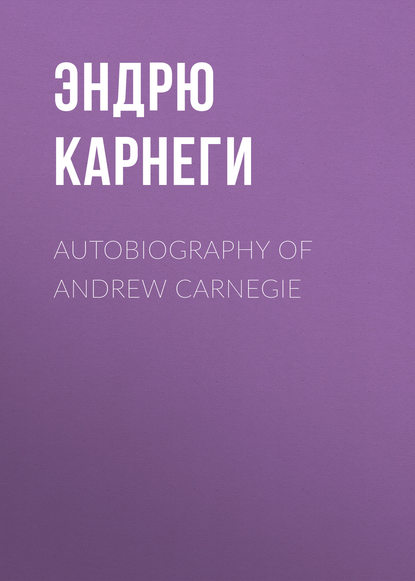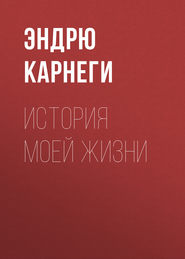По всем вопросам обращайтесь на: info@litportal.ru
(©) 2003-2024.
✖
Autobiography of Andrew Carnegie
Настройки чтения
Размер шрифта
Высота строк
Поля
The Carnegie benefactions, all told, amount to something over $350,000,000—surely a huge sum to have been brought together and then distributed by one man.
47
This fund is now managed separately.
48
The total amount of this fund in 1919 was $29,250,000.
49
Columbia University in 1920 numbered all told some 25,000 students in the various departments.
50
It amounts to $250,000.
51
At the Meeting in Memory of the Life and Work of Andrew Carnegie held on April 25, 1920, in the Engineering Societies Building in New York, Mr. Root made an address in the course of which, speaking of Mr. Carnegie, he said:
52
The universities, colleges, and educational institutions to which Mr. Carnegie gave either endowment funds or buildings number five hundred. All told his gifts to them amounted to $27,000,000.
53
The "organ department" up to 1919 had given 7689 organs to as many different churches at a cost of over six million dollars.
54
This amounted to over $250,000 a year.
55
"Let men say what they will, I say that as surely as the sun in the heavens once shone upon Britain and America united, so surely it is one morning to rise, shine upon, and greet again the Reunited States—the British-American Union." (Quoted in Alderson's Andrew Carnegie, The Man and His Work, p. 108. New York, 1909.)
56
George Peabody, the American merchant and philanthropist, who died in London in 1869.
57
"I submit that the only measure required to-day for the maintenance of world peace is an agreement between three or four of the leading Civilized Powers (and as many more as desire to join—the more the better) pledged to coöperate against disturbers of world peace, should such arise." (Andrew Carnegie, in address at unveiling of a bust of William Randall Cremer at the Peace Palace of The Hague, August 29, 1913.)
58
Mr. Carnegie does not mention the fact that in December, 1910, he gave to a board of trustees $10,000,000, the revenue of which was to be administered for "the abolition of international war, the foulest blot upon our civilization." This is known as the Carnegie Endowment for International Peace. The Honorable Elihu Root is president of the board of trustees.
59
Mr. Carnegie received also the Grand Cross Order of Orange-Nassau from Holland, the Grand Cross Order of Danebrog from Denmark, a gold medal from twenty-one American Republics and had doctors' degrees from innumerable universities and colleges. He was also a member of many institutes, learned societies and clubs—over 190 in number.
60
Additional gifts, made later, brought this gift up to $3,750,000.
61
Mr. Carnegie refers to the gift of ten million dollars to the Carnegie United Kingdom Trust merely in connection with Earl Grey. His references to his gifts are casual, in that he refers only to the ones in which he happens for the moment to be interested. Those he mentions are merely a part of the whole. He gave to the Church Peace Union over $2,000,000, to the United Engineering Society $1,500,000, to the International Bureau of American Republics $850,000, and to a score or more of research, hospital, and educational boards sums ranging from $100,000 to $500,000. He gave to various towns and cities over twenty-eight hundred library buildings at a cost of over $60,000,000. The largest of his gifts he does not mention at all. This was made in 1911 to the Carnegie Corporation of New York and was $125,000,000. The Corporation is the residuary legatee under Mr. Carnegie's will and it is not yet known what further sum may come to it through that instrument. The object of the Corporation, as defined by Mr. Carnegie himself in a letter to the trustees, is:
62
"Yesterday we had a busy day in Toronto. The grand event was a dinner at six o'clock where we all spoke, A.C. making a remarkable address.... I can't tell you how I am enjoying this. Not only seeing new places, but the talks with our own party. It is, indeed, a liberal education. A.C. is truly a 'great' man; that is, a man of enormous faculty and a great imagination. I don't remember any friend who has such a range of poetical quotation, unless it is Stedman. (Not so much range as numerous quotations from Shakespeare, Burns, Byron, etc.) His views are truly large and prophetic. And, unless I am mistaken, he has a genuine ethical character. He is not perfect, but he is most interesting and remarkable; a true democrat; his benevolent actions having a root in principle and character. He is not accidentally the intimate friend of such high natures as Arnold and Morley." (Letters of Richard Watson Gilder, edited by his daughter Rosamond Gilder, p. 374. New York, 1916.)
63
Triumphant Democracy, or Fifty Years' March of the Republic. London and New York, 1886.
64
Campbell-Bannerman was chosen leader of the Liberal Party in December, 1898.
65
Mr. Carnegie had received no less than fifty-four Freedoms of cities in Great Britain and Ireland. This was a record—Mr. Gladstone coming second with seventeen.
66
The whole paragraph is as follows: "How beautiful is Dunfermline seen from the Ferry Hills, its grand old Abbey towering over all, seeming to hallow the city, and to lend a charm and dignity to the lowliest tenement! Nor is there in all broad Scotland, nor in many places elsewhere that I know of, a more varied and delightful view than that obtained from the Park upon a fine day. What Benares is to the Hindoo, Mecca to the Mohammedan, Jerusalem to the Christian, all that Dunfermline is to me." (An American Four-in-Hand in Britain, p. 282.)
67
An American Four-in-Hand in Britain.
68
"Mr. Carnegie had proved his originality, fullness of mind, and bold strength of character, as much or more in the distribution of wealth as he had shown skill and foresight in its acquisition. We had become known to one another more than twenty years before through Matthew Arnold. His extraordinary freshness of spirit easily carried Arnold, Herbert Spencer, myself, and afterwards many others, high over an occasional crudity or haste in judgment such as befalls the best of us in ardent hours. People with a genius for picking up pins made as much as they liked of this: it was wiser to do justice to his spacious feel for the great objects of the world—for knowledge and its spread, invention, light, improvement of social relations, equal chances to the talents, the passion for peace. These are glorious things; a touch of exaggeration in expression is easy to set right.... A man of high and wide and well-earned mark in his generation." (John, Viscount Morley, in Recollections, vol. II, pp. 110, 112. New York, 1919.)
69
Mr. Carnegie acquired no less than eighteen British newspapers with the idea of promoting radical views. The political results were disappointing, but with his genius for making money the pecuniary results were more than satisfactory.
70
Triumphant Democracy, or Fifty Years' March of the Republic. London, 1886; New York, 1888.
71
Другие электронные книги автора Эндрю Карнеги
История моей жизни




 4.67
4.67







